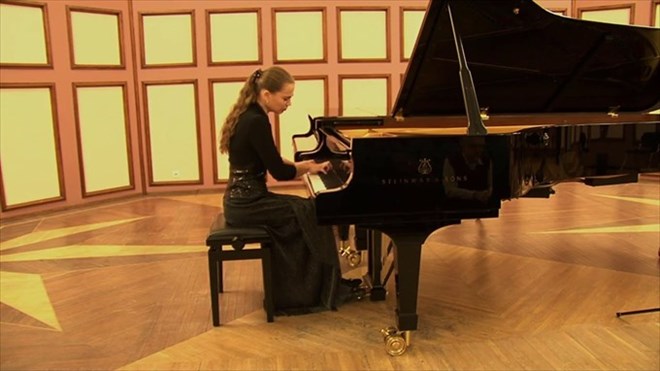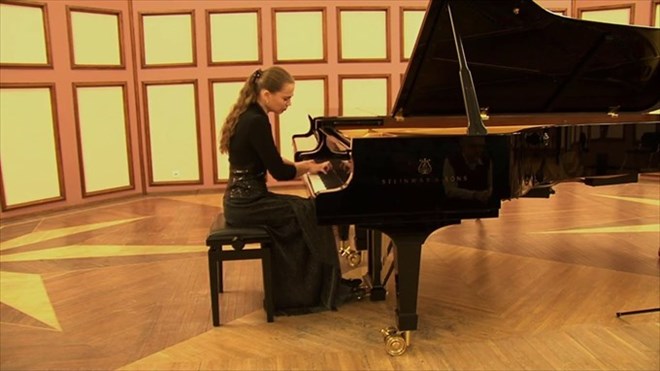
Pianist Anna Grot and violinist Polina Borisova from Russia will present a classical music performance as part of the framework of the annual programme Arts Ambassador in big cities on June 6-8.

Pianist Anna Grot (Photo courtesy of the Saint Petersburg House of
Music)
The event is being held by the Russian Centre for Science and Culture in Hanoi,
in collaboration with the Saint Petersburg House of Music, to mark the National
Day of Russia.
The concert will feature outstanding pieces created for violin and piano by
world famous composers including Nikolay Rimsky-Korsakov, Franz Liszt, Pyotr
Ilyich Tchaikovsky and Alexander Glazunov.
Due to their outstanding talents, the young artists have won prestigious awards
at numerous music competitions in both Russia and throughout the world.
Borisova was born in Ryazan, in 1988. When she was four, she started her music
education at children’s music school. In 2007, Polina finished the Chopin
Moscow State College of Music Performance. In 2012, she graduated from the
Tchaikovsky Moscow State Conservatory and in 2014 graduated from post-graduate
studies. Since 2015 she has worked as an assistant lecturer at the Moscow
Conservatory. She is laureate of various international competitions.
Grot was born in 1990 in the town of Chekhov in Moscow. She graduated from the
Central Music School at the Moscow Tchaikovsky Conservatory. She is a winner of
many international competitions. Honored Artist of Russia, Professor Andrei
Pisarev, remarked on her as a "brilliant virtuoso and artistic qualities, a
bright temperament, a developed and mature musician”.
Through the unique performances, the Arts Ambassador concert offers an
opportunity for Vietnamese music lovers to learn more about Russian classical
music, said N V Shafinskaya, director of the Russian Centre for
Science and Culture in Hanoi.
The event also contributes to strengthening the traditional friendship between
Vietnam and Russia as well as enhancing mutual understanding between the two
countries' people.
The concerts will take place on June 6 at the National Music Academy (Hanoi),
on June 7 at the Nguyen Hien Dinh Tuong (Classical Drama) Theatre (Da Nang) and
on June 8 at the HCM City Music Academy (HCM City). Entrance is free.
Source: VNA
With an increasingly vibrant and widespread emulation movement aimed at building cultured residential areas and cultured families, Yen Thuy District has been making steady progress toward improving both the material and spiritual well-being of its people, while fostering a civilized, prosperous, beautiful, and progressive community.
Once lacking recreational spaces and community facilities, Residential Group 2 in Quynh Lam Ward (Hoa Binh City) has recently received attention for the construction of a new, spacious, and fully equipped cultural house. The project followed the model of state support combined with public contributions in both labor and funding.
The "All people unite to build cultural life" movement, which has been effectively integrated with Kim Boi district’s socio-economic development goals, is fostering a lively spirit of emulation across local residential areas, hamlets, villages, public agencies, and enterprises. In addition, through the initiative, traditional cultural values are being preserved and promoted, while community solidarity and mutual support in poverty reduction and economic development are being strengthened.
A working delegation of the Hoa Binh provincial People’s Committee led by its Permanent Vice Chairman Nguyen Van Toan on June 11 inspected the progress of a project to build the Mo Muong Cultural Heritage Conservation Space linked to tourism services in Hop Phong commune, Cao Phong district.
Born and growing in the heroic land of Muong Dong, Dinh Thi Kieu Dung, a resident in Bo town of Kim Boi district, in her childhood was nurtured by the sweet lullabies of her grandmother and mother. These melodies deeply imprinted on her soul, becoming an inseparable part of her love for her ethnic group's culture. For over 20 years, this love for her hometown has driven Dung to research, collect, and pass down the cultural values of the Muong people to future generations.
In the final days of May, the Ethnic Art Troupe of Hoa Binh Province organized performances to serve the people in remote, mountainous, and particularly disadvantaged areas within the province. These were not just ordinary artistic shows, but they were the meaningful journeys aimed at spreading cultural values, enhancing the spiritual life of the people and contributing to the preservation of ethnic minority cultural identities.



